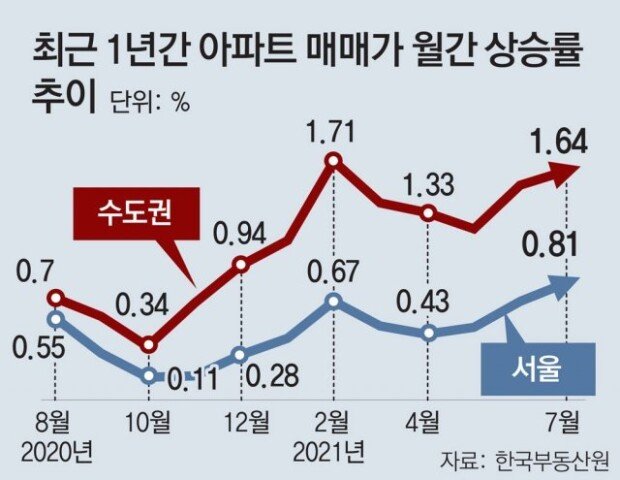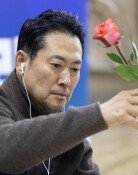Apartment prices jump 8.73% driven by shortage of jeonse
Apartment prices jump 8.73% driven by shortage of jeonse
Posted August. 18, 2021 07:32,
Updated August. 18, 2021 07:32

The rate of increase in apartment prices across the country from January to July this year surpassed last year’s increase rate. The increase in house prices curbed for a while after the Feb. 4 housing supply plan, but house prices are rising at a fast pace again with more young people purchasing houses due to the shortage of jeonse caused by revisions to the Housing Lease Protection Act.
According to the National Housing Price Trend in July announced by the Korea Real Estate Board on Tuesday, apartment prices nationwide jumped 8.73 percent from January to July this year. This is higher than the same period of last year (3.68%) and the annual increase rate of last year (7.57%).
The rate of increase in jeonse prices in the first seven months of this year also doubled compared to the same period of last year. Jeonse prices for apartments in Incheon, which had the highest increase rate in the country, rose 10.79 percent in seven months, exceeding the annual increase rate of last year (9.89%).
According to experts, the country is seeing a rise in house and jeonse prices again after it experienced the same trend in July last year, when revisions to the Housing Lease Protection Act passed the National Assembly. A shortage of jeonse forced people to buy houses, increasing sales demand, and the sharply increased jeonse prices are in turn pushing up house prices. House prices are highly likely to rise further down the road in the Seoul metropolitan area, where the shortage of jeonse is severe, as there will not be enough supply for the time being.
Young people are likely to continue to buy houses for a while. In the survey, a higher percentage of people in their 30s said “Owning a house is necessary for housing stability (88.4%)” and “I plan to purchase a house in the future (66.9%)” compared to other age groups. People in their 30s feel a stronger need to own a house as their need for a house increases due to marriage or childbirth, and they are sensitive to wealth driven by homeownership.
Ho-Kyeong Kim kimhk@donga.com






![[김순덕의 도발] ‘李부터 연임’ 개헌, 이 대통령은 가능성을 말했다](https://dimg.donga.com/c/138/175/90/1/wps/NEWS/IMAGE/2026/01/16/133172656.1.jpg)
